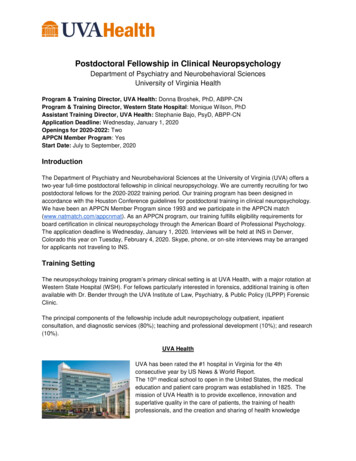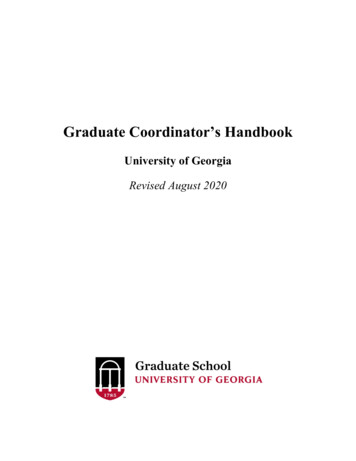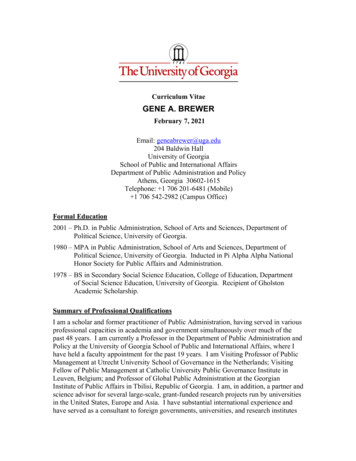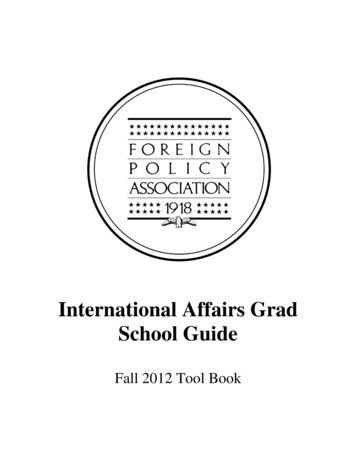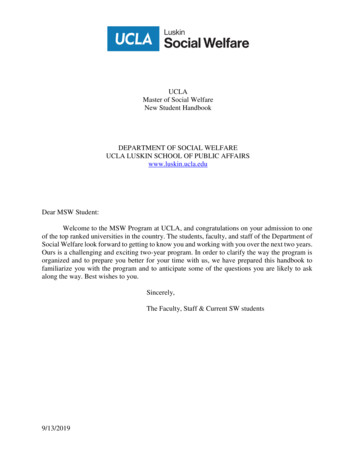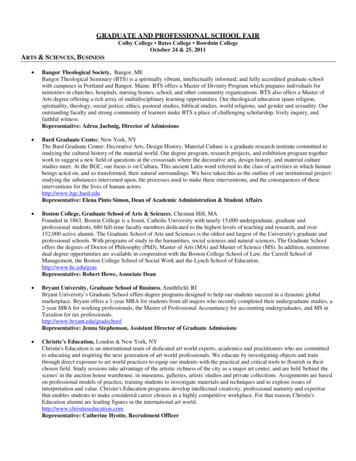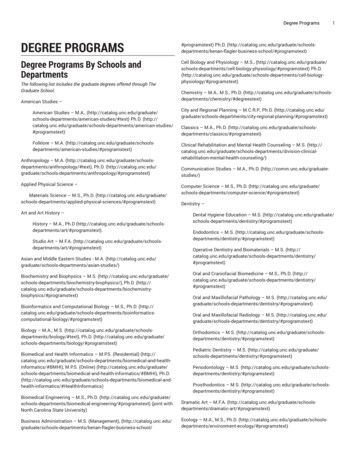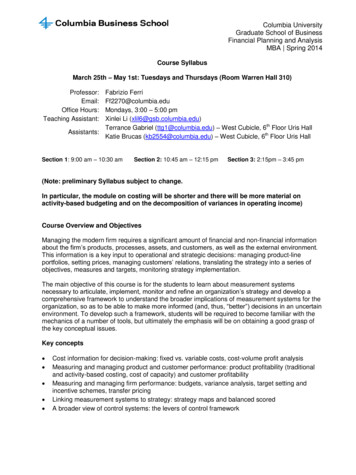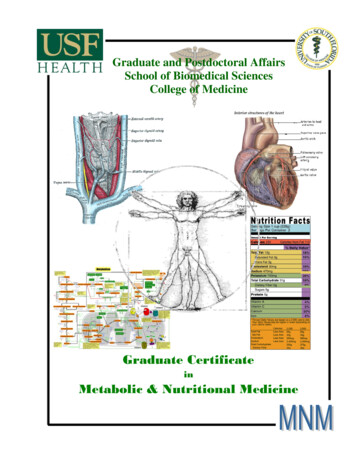
Transcription
Graduate and Postdoctoral AffairsSchool of Biomedical SciencesCollege of MedicineGraduate CertificateinMetabolic & Nutritional Medicine
Graduate CertificateMetabolic & Nutritional MedicinePurpose of the Certificate: This graduate certificate is directed towards health-careprofessionals who have an interest in the medical aspects of metabolic and nutritional medicinefrom both clinical care and basic research perspectives and who wish to extend their knowledgein these areas of medicine as part of a continuous process of delivering advanced health care.Certificate Description: Considered the vanguard of the new millennium in which sciencetruly complements the art of medicine, integration of the traditional “basic science” and “clinicalscience” disciplines that form the foundation of the traditional medical curriculum has been theobjective in training clinicians who strive to understand the molecular and physiological bases ofdisease and the aging process with the objective of developing and implementing newapproaches to retard and potentially reverse the aging process in patients using new therapies andpreventative measures such as nutritional intervention and complementary and alternativemedicine (CAM).Recent changes in the focus of research and scholarship in the biomedical sciences has directedattention to the development and training of clinicians in “translational medicine” who are ableto cross the barriers of traditional disciplines and embrace the concepts of interdisciplinaryapproaches to treating the aging process and associated diseases. The new Graduate Certificate inMetabolic & Nutritional Medicine (MNM) in the College of Medicine, has been developed toprovide a novel interdisciplinary and concentrated program of study that is designed forpracticing clinicians and other experienced health-care professionals who are committed todeveloping their theoretical and practical expertise in this rapidly evolving field of medical careand who value the interdisciplinary approach to the medical sciences.Metabolic Medicine can be defined as a group of overlapping areas of clinical practice withcommon dependence on a detailed understanding of basic biochemistry and metabolism togetherwith other cellular processes. It therefore falls within the areas of expertise of many of theclinical disciplines that emphasize nutritional disorders, inborn errors of metabolism (IEM) andpathophysiological changes. Examples of these areas include disorders of nutrition, IEM,disorders of lipid metabolism and CV risk assessment, disorders of calcium metabolism and boneand diabetes and decreases in cognitive skills.The Metabolic & Nutritional Medicine certificate focuses on the application of the principles ofmetabolic and nutritional medicine to the aging process in humans, but has applications to allstages of development. Studies have indicated that the aging process cannot be conceptualized byprobing a solitary gene or individual metabolic pathways, but should best be addressed at thesystems level. Biological examples of aging include not only the sum total of shortenedtelomeres, the array of denatured proteins and modified DNA molecules but also examples of theoxidative damage to mitochondria and programmed cell death or apoptosis. In addition, theaging process also results in alterations in key regulatory nodes critical for maintaining theintegrity of the organism. A dynamic progression, aging increases imbalances in the organism asa result of degenerating biological processes.Graduate Certificate in. Metabolic & Nutritional Medicine
A regenerative medicine approach to clinical care provides an integrativemethodology to optimize the body’s endogenous mechanisms of self-repairtogether with the inclusion of proven exogenous treatments and technologies thathave been demonstrated to influence the aging process. This novel graduatecertificate focuses on the functional and regenerative medicine components of themajor disciplines that comprise the “basic and clinical sciences” in traditionalmedical school curricula and includes courses that integrate endocrinology, cardiovasculardisease, intermediary metabolism, genetics, immunology, neurobiology, pharmacology, nutritionand physiology with biomedical aging. These clinically-oriented subject areas have beencombined to provide both a solid foundation and include the most recent advances in metabolicand nutritional medicine. The rigorous program is designed to enable participants to expand andenhance their medical skills for the future clinical practice of metabolic and nutritional medicine.The main objectives of the Metabolic and Nutritional Medicine graduate certificate are to: Provide advanced scientific and clinical training for several areas of medicinewhich require greater knowledge than delivered in most organ-based specialties.For example, these include the subject area of biochemistry and molecular biology,genetics, endocrinology, cardiovascular physiology, immunology, cancer andnutrition. Further develop the clinical training of physicians and other health-carepractitioners who wish to include metabolic and nutritional medicine in theircurrent practices. Support the academic progress and development of Metabolic and NutritionalMedicine as an advanced specialization.The interdisciplinary nature of the certificate promotes a broad intellectual focus that is requiredof current and future professional and graduate students in the clinical sciences. A novel featureof the certificate is that all course materials are delivered using a concentrated lecture formatcombined with extensive “web casts” and relevant practical experience that encourages activeparticipation by all students enrolled in the program.Relationship to the USF Strategic Plan:The proposed Graduate Certificate in Metabolic & Nutritional Medicine will contribute to theUniversity’s strategic plan in the following goals and strategies:Goal 1Expanding world-class interdisciplinary research, creative and scholarly endeavors. Promote nationally and internationally distinctive and prominent research andgraduate programs.The Metabolic & Nutritional Medicine certificate represents a new, integrated graduate programthat primarily focuses on the translational aspects of the basic and clinical sciences componentsof the traditional medical curriculum and expands access to courses and material that arenormally only available to students enrolled in professional medical programs or previousgraduates of professional medical programs. In addition, the combination of the “concentrated”course format together with extensive webcasts and practical experience represents a newapproach to delivering courses of this type in the State of Florida.Goal IIGraduate Certificate in. Metabolic & Nutritional Medicine
Promoting globally competitive undergraduate, graduate and professional programs thatsupport interdisciplinary inquiry, intellectual development, knowledge and skillacquisition, and student success through a diverse, fully- engaged, learner-centered campusenvironment. Create and support globally competitive, relevant and distinctive academic programsthat address the changing needs of the region, state and nation through innovativeapproaches to curriculum development and delivery, Provide increased access to excellence in higher education for students whodemonstrate the aptitude to succeed, Enhance and expand the talent pool by shaping the enrollment profile of USF’sgraduate student body to reflect that found at a pre-eminent research university.The Metabolic & Nutritional Medicine Graduate Certificate represents a new and distinctiveacademic endeavor by virtue of its component courses and their associated content. Theinnovative courses and method of instructional delivery will address the region’s and state’s needfor more clinicians and health-care professionals that are trained in regenerative, metabolic andnutritional medicine. The inclusion of modern distance education technologies will significantlyexpand access to these courses by students who substantially exceed the minimum entryqualifications for USF’s graduate programs and are unable to register for the College’straditional courses owing to geographical or career scheduling limitations. In addition, studentswho successfully complete the program will have demonstrated substantial academic ability andwill be well-prepared to continue their education in USF’s translational doctoral program,resulting in an expanded applicant pool.Program (Major): Graduate Certificate in Metabolic and Nutritional MedicineRequirements: The proposed curriculum is attached and features a combination of eightclinically-oriented courses. Program participants are required to select four (4) courses form thelist such that the certificate can be completed in approximately one year. For admission, studentsmust meet the minimum qualifications of the Graduate School. In addition, program applicantsmust possess either a M.D. degree or a Ph.D. degree or their equivalent in the health sciencesfrom a regionally accredited institution. The majority of students typically applying to this typeof program significantly exceed these minimums.Total Hours: 12 credit hours; 180 total contact hoursBudget Account Number: USF01HSC10000-610601-000000-0000000Proposed Catalog Copy: This innovative, interdisciplinary certificate program, the first inthe State of Florida to provide an integrated approach to the subject areas of metabolic andnutritional medicine and incorporating both didactic and distance education techniques, isdesigned for individuals who wish to gain advanced training in the medical disciplines ofendocrinology, cardiovascular disease, intermediary metabolism, genetics, immunology,pharmacology, nutrition, neurobiology, physiology and biomedical aging. These courses provideprogram participants with an extensive background in the basic and clinical sciences related tometabolic and nutritional medicine.Graduate Certificate in. Metabolic & Nutritional Medicine
The certificate has been constructed to prepare individuals for future translationalendeavors in metabolic and nutritional medicine. The certificate is also designed to fulfill theincreasing demand for trained individuals in the specialty of regenerative medicine and isfounded on the premise that future clinicians, educators and researchers in the regenerativemedical sciences will require extensive interdisciplinary training in order to develop novelsolutions to current biomedical problems.The interdisciplinary curriculum has been organized to provide the background trainingthat will equip students with the essential tools for a successful practice in the areas of metabolicand nutritional medicine. The program requires 12 credit hours, which can be completed in aminimum of three semesters of study. The four required courses provide both foundation andadvanced training and represent an integrated approach to metabolic and nutritional medicine.Students can select from ten different courses to tailor the program to their future career goals.All the courses are provided in both an intense lecture and “on-line” or distance formatexpanding access to students who may experience geographical or scheduling limitations. Theprogram also features an extensive array of web casts to further supplement the lecture materialtogether with a broad array of clinical experiences.Accreditation:Accredited by the Commission on Colleges of the Southern Association of College and Schools.ADMISSION INFORMATIONMust meet University requirements (see Graduate Admissions) as well as requirements listedbelow.Program Admission Requirements:1. A M.D., D.O., Ph.D., D.P.T. or D.N.P. degree or their equivalent from a regionally accrediteduniversity in the health sciences or a Master’s degree or the equivalent in a biomedical sciencefield from a regionally accredited university.Program Faculty:All the program faculty involved in the delivery of the associated courses are senior M.D.and/or Ph.D.-level instructors who have a minimum of 8-years experience in clinical practice andmedical education.DEGREE PROGRAM REQUIREMENTSThe following table indicates the courses and their associated credit hours that student’s mustsuccessfully complete to be awarded the Graduate Certificate in Metabolic & NutritionalMedicine.Graduate Certificate in. Metabolic & Nutritional Medicine
School of Biomedical SciencesCollege of MedicineGraduate Certificate inMetabolic & Nutritional MedicineCertificate Curriculum:Courses (select any four)CreditCreditGMS 6XXX Clinical Approach to Endocrinology (Smith/Barber)GMS 6XXX Diabetes and Coronary Heart Disease” (Smith/Barber)GMS 6XXX Integrated Clinical Neurobiology (Smith/Barber)GMS 6XXX Nutrition and Metabolism (Smith/Barber)GMS 6XXX Functional Medicine and Infectious Disease (Smith/Barber)GMS 6XXX Autoimmune Diseases and Cognitive Function (Smith/Barber)GMS 6XXX Laboratory Fundamentals and Adjunct Cancer Therapies (Smith/Barber)GMS 6XXX Clinical Nutrition (Barber)33333333TOTAL PROGRAM CREDITS (minimum)12Graduate Certificate in. Metabolic & Nutritional Medicine
Graduate Certificate in Metabolic & Nutritional MedicineCourse descriptions:GMS 6XXX “Clinical Approaches to Endocrinology” (3 cr. hrs)The course focuses on the function of the human endocrine system and examines factors that influence hormonefunction and physiological hormone balance. Clinical approaches to achieving hormone homeostasis are emphasizedincluding examples of appropriate hormone replacement therapies.GMS 6XXX “Diabetes and Coronary Heart Disease” (3 cr. hrs)The course examines fundamental aspects of diabetes, coronary heart disease and inflammation critical tounderstanding the factors that result in degraded cardiovascular tone and the biochemical and cellular mechanismsrelevant to the correct maintenance of carbohydrate metabolism and the role of inflammation in the progression ofvarious diseases.GMS 6XXX “Integrated Clinical Neurobiology” (3 cr. hrs)The course introduces the major principles of neurology and the role of neurotransmitters in cellular function andcommunication between various cell types and also focuses on the importance of gastrointestinal health inrelationship to the immune system and neurotransmitter function.GMS 6XXX “Nutrition and Metabolism” (3 cr. hrs)The course provides a detailed discussion of the experimental analysis of human nutrition together with a discussionof the methods used in detoxification of exogenous toxins. In addition, the course focuses on a critical analysis ofthe roles of fatty acid and amino acid metabolism in organ homeostasis.GMS 6XXX “Functional Medicine and Infectious Disease” (3 cr. hrs)This course covers advanced human nutrition together with the utilization of various botanical supplements thathave been applied to metabolic and nutritional medicine. A functional approach to infectious diseases will also beexplored.GMS 6XXX “Autoimmune Diseases and Cognitive Function” (3 cr. hrs)Basic and clinical aspects of memory enhancement and memory loss are described together with the majorphysiological changes that result from various autoimmune diseases. Also discussed are the critical roles ofmitochondria in cellular energy metabolism, the common causes of oxidative stress and the consequences of heavymetal toxicity.GMS 6XXX “Laboratory Fundamentals and Adjunct Cancer Therapies” (3 cr. hrs)This course presents and extensive review of clinical laboratory fundamentals as part of the disease diagnosisprocess. Also included are discussions of the major psychiatric diseases together with an introduction to the subjectsof sports medicine and addiction medicine. The course emphasizes the experimental basis for factual knowledge inmodern medical physiology, the therapies designed to reverse adverse cellular functions and adjunct therapies forcancer management.GMS 6XXX “Clinical Nutrition” (3 cr. hrs)A course that is designed to provide a thorough foundation in all aspects of human nutrition and which emphasizesthe close relationship between nutrition and various chronic diseases. Course topics include the properties of majornutrients, obesity, weight management, nutrition during the life cycle, vitamins, enteral and parenteral nutrition andnutritional aspects of specific diseases, including cardiovascular disease and cancer.Graduate Certificate in. Metabolic & Nutritional Medicine
Graduate Certificate in. Metabolic & Nutritional Medicine
Graduate Certificate in. Metabolic & Nutritional Medicine
Enhance and expand the talent pool by shaping the enrollment profile of USF’s graduate student body to reflect that found at a pre-eminent research university. The Metabolic & Nutritional Medicine Graduate Certificate represents a new and distinctive academic endeavor by virtue of its component courses and their associated content. The
